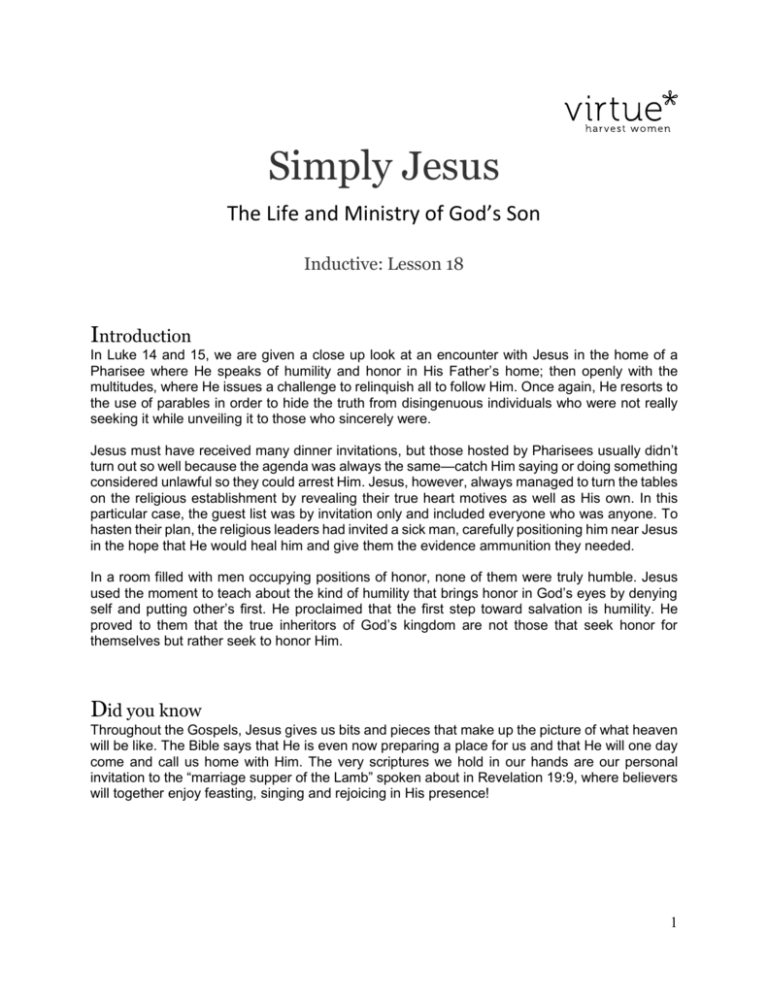
Simply Jesus
The Life and Ministry of God’s Son
Inductive: Lesson 18
Introduction
In Luke 14 and 15, we are given a close up look at an encounter with Jesus in the home of a
Pharisee where He speaks of humility and honor in His Father’s home; then openly with the
multitudes, where He issues a challenge to relinquish all to follow Him. Once again, He resorts to
the use of parables in order to hide the truth from disingenuous individuals who were not really
seeking it while unveiling it to those who sincerely were.
Jesus must have received many dinner invitations, but those hosted by Pharisees usually didn’t
turn out so well because the agenda was always the same—catch Him saying or doing something
considered unlawful so they could arrest Him. Jesus, however, always managed to turn the tables
on the religious establishment by revealing their true heart motives as well as His own. In this
particular case, the guest list was by invitation only and included everyone who was anyone. To
hasten their plan, the religious leaders had invited a sick man, carefully positioning him near Jesus
in the hope that He would heal him and give them the evidence ammunition they needed.
In a room filled with men occupying positions of honor, none of them were truly humble. Jesus
used the moment to teach about the kind of humility that brings honor in God’s eyes by denying
self and putting other’s first. He proclaimed that the first step toward salvation is humility. He
proved to them that the true inheritors of God’s kingdom are not those that seek honor for
themselves but rather seek to honor Him.
Did you know
Throughout the Gospels, Jesus gives us bits and pieces that make up the picture of what heaven
will be like. The Bible says that He is even now preparing a place for us and that He will one day
come and call us home with Him. The very scriptures we hold in our hands are our personal
invitation to the “marriage supper of the Lamb” spoken about in Revelation 19:9, where believers
will together enjoy feasting, singing and rejoicing in His presence!
1
Open your Bible and lesson each day by beginning with a word of prayer.
Up Close ~
The chart below represents a reader’s guide to the contents of this week’s lesson. The topical
teachings and/or events covered are followed by the primary scriptural text as well as the
supportive parallel passages. You will be able to receive and grasp a well-rounded picture of the
story narrative in the Gospel harmony by reading every passage. However, using the bolded text
as your point of reference (your anchor text) will allow you to determine the facts, lessons, and
personal applications necessary to formulate your own conclusions.
Teaching / Event
Man with Dropsy is Healed
Scripture Text
Luke 14:1–6
Take the Lowly Place
Parable of the Great Supper
Counting the Cost
Parable of the Lost Sheep
Parable of the Lost Coin
Parable of the Lost Son
Luke 14:7–14
Luke 14:15–24
Luke 14:25–33
Luke 15:1–7
Luke 15:8–10
Luke 15:11–32
Parallel Passages
First Impressions: Group Discussion
Reflect for a moment on the passages you have just read.
Respond by recording your first impressions from your initial reading of the text. Be prepared to
share one of your impressions with your discussion group.
Heartbeat: Luke 15:7 NKJV (Memory verse)
(Write it out once in the space below. Practice it each time you open your lesson.)
I say to you that likewise there will be more joy in heaven over one sinner who repents
than over ninety-nine just persons who need no repentance.
2
Luke 14:7–14
Take the Lowly Place
7 So He told a parable to those who were invited, when He noted how they chose
the best places, saying to them:
8 ‘When you are invited by anyone to a wedding feast, do not sit down in the best place,
lest one more honorable than you be invited by him;
9 and he who invited you and him come and say to you, “Give place to this man,” and
then you begin with shame to take the lowest place.
10 But when you are invited, go and sit down in the lowest place,
so that when he who invited you comes he may say to you, “Friend, go up higher.”
Then you will have glory in the presence of those who sit at the table with you.
11 For whoever exalts himself will be humbled, and he who humbles himself will be exalted.’
12 Then He also said to him who invited Him, ‘When you give a dinner or a supper,
do not ask your friends, your brothers, your relatives, nor rich neighbors,
lest they also invite you back, and you be repaid.
13 But when you give a feast, invite the poor, the maimed, the lame, the blind.
14 And you will be blessed, because they cannot repay you; for you shall be repaid
at the resurrection of the just.’
Luke 14:25–33
Counting the Cost
25 Now great multitudes went with Him. And He turned and said to them,
26 ‘If anyone comes to Me and does not hate his father and mother, wife and children,
brothers and sisters, yes, and his own life also, he cannot be My disciple.
27 And whoever does not bear his cross and come after Me cannot be My disciple.
28 For which of you, intending to build a tower, does not sit down first and count the cost,
whether he has enough to finish it—29 lest, after he has laid the foundation,
and is not able to finish, all who see it begin to mock him,
30 saying, ‘This man began to build and was not able to finish.’
3
31 Or what king, going to make war against another king, does not sit down first and
consider whether he is able with ten thousand to meet him who
comes against him with twenty thousand?
32 Or else, while the other is still a great way off, he sends a delegation and
asks conditions of peace,
33 So likewise, whoever of you does not forsake all that he has cannot be My disciple.’
Luke 15:1–7
Parable of the Lost Sheep
1 Then all the tax collectors and the sinners drew near to Him to hear Him.
2 And the Pharisees and scribes complained, saying, ‘This Man receives sinners and
eats with them.’ 3 So He spoke this parable to them, saying:
4 ‘What man of you, having a hundred sheep, if he loses one of them, does not leave the ninetynine in the wilderness, and go after the one which is lost until he finds it?
5 And when he has found it, he lays it on his shoulders, rejoicing.
6 And when he comes home, he calls together his friends and neighbors, saying to them,
“Rejoice with me, for I have found my sheep which was lost!”
7 I say to you that likewise there will be more joy in heaven over one sinner who repents than
over ninety nine just persons who need no repentance.’
Luke 15:8–10
Parable of the Lost Coin
8 Or what woman, having ten silver coins, if she loses one coin, does not light a lamp,
sweep the house, and search carefully until she finds it?
9 And when she has found it, she calls her friends and neighbors together, saying,
‘Rejoice with me, for I have found the piece which I lost!’
10 Likewise, I say to you, there is joy in the presence of the angels of God over
one sinner who repents.
(Scripture from the New King James Bible, © 1980 by Thomas Nelson, Inc. Used by permission.)
4
Observation: Look!
Pray. Read the Bible passage several times, trying to get a big picture of what is going on.
Left Column (Facts): Following the writer in the order he tells the story, briefly describe who is
involved, what is happening, when and where the events are taking place.
Right Column (Observations): Look closely to observe details. Some questions you may ask:
What do you know about the people involved in the story? What questions does the story
raise? What sources of conflict do you see? What does Jesus identify as true and
important to life?
Put yourself in the Biblical character’s shoes. What were his ambitions? How did the
character relate to others or to God? What problem did he think he faced? Did Jesus
identify a different problem in his life? What did he discover about God? How did he
respond?
Are there any words that you are not familiar with? Look up the definition.
Are there words or phrases that are repeated or emphasized? Why are they key?
Identify comparisons, such as “The kingdom of heaven is like leaven…” What do you know
about leaven (yeast)? Identify contrasts, such as “You have heard it said…but I say to
you…”
Extra: Record information you may find in Bible dictionaries, maps, handbooks, or
encyclopedias. Understanding the culture/time in which Jesus lived will help you discover
the meaning of the text.
Luke 14:7–14
Take the Lowly Place
What does it say? (Facts from passage)
What do I see? (Personal research/observations)
5
Luke 14:25–33
Counting the Cost
What does it say? (Facts from passage)
Luke 15:1–7
Parable of the Lost Sheep
What does it say? (Facts from passage)
Luke 15:8–10
What do I see? (Personal research/observations)
What do I see? (Personal research/observations)
Parable of the Lost Coin
What does it say? (Facts from passage)
What do I see? (Personal research/observations)
6
Interpretation: What does it mean?
Pray. The more time you take to observe the passage, the more you will have a basis for
understanding what God’s Word means. Interpretation always seeks to answer the questions,
“What was God saying to the original audience?” and then, “How does that same truth relate to
life today?” Asking yourself questions will help you see the spiritual lesson in the text: What does
this teach me is true about God? What does it teach me is true about mankind? Is there a
command to obey? Is there a promise to claim? Is there a condition to the promise? Is there an
example I should follow or avoid? A spiritual lesson is a timeless truth that points to God and
speaks to the heart of man. Stating the lesson in a sentence of 10 words or less will help you
keep it simple and memorable.
Application: How does it apply to me? Pray. Practicing Biblical truth day-to-day is the
only way to grow in Christ and reflect the glory of God. To apply the spiritual lesson you have
learned from the text, you have to take deliberate action. Take the time to examine yourself, and
ask: Does this spiritual lesson point out error in my thoughts about God? Does it point to error in
my attitude or actions? How does this lesson relate to my home life, my work, my relationships,
how I spend my time, etc.? What change is required? What practical steps will I take to make that
change? Write your application in the form of a question to help make it personal.
Luke 14:7–14
Lesson:
Application:
Luke 14:25–33
Lesson:
Application:
Luke 15:1–7
Lesson:
Application:
Luke 15:8–10
Lesson:
Application:
7
Behold & Be Transformed
What did you see as you beheld God’s Son?
____________________________________________________________________________
____________________________________________________________________________
____________________________________________________________________________
____________________________________________________________________________
____________________________________________________________________________
____________________________________________________________________________
How does beholding (looking upon) Him, motivate you to change your thoughts, habit, attitude,
speech or actions?
____________________________________________________________________________
____________________________________________________________________________
____________________________________________________________________________
Pause . . . What is the most significant lesson you have learned this week?
____________________________________________________________________________
____________________________________________________________________________
____________________________________________________________________________
Ponder . . . How will you put it into practice?
____________________________________________________________________________
____________________________________________________________________________
____________________________________________________________________________
Pray . . . Write out your prayer and be specific.
____________________________________________________________________________
____________________________________________________________________________
____________________________________________________________________________
____________________________________________________________________________
____________________________________________________________________________
____________________________________________________________________________
© 2013 Janis J. Vance, All Rights Reserved. Used by permission.
8
Notes
____________________________________________________________________________
____________________________________________________________________________
____________________________________________________________________________
____________________________________________________________________________
____________________________________________________________________________
____________________________________________________________________________
____________________________________________________________________________
____________________________________________________________________________
____________________________________________________________________________
____________________________________________________________________________
____________________________________________________________________________
____________________________________________________________________________
____________________________________________________________________________
____________________________________________________________________________
____________________________________________________________________________
____________________________________________________________________________
____________________________________________________________________________
____________________________________________________________________________
____________________________________________________________________________
____________________________________________________________________________
____________________________________________________________________________
____________________________________________________________________________
____________________________________________________________________________
____________________________________________________________________________
____________________________________________________________________________
____________________________________________________________________________
____________________________________________________________________________
____________________________________________________________________________
____________________________________________________________________________
____________________________________________________________________________
9
10








